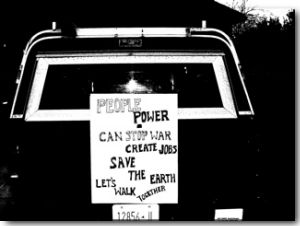by Martin Murie

People Power Martin Murie, 2009 |
(Swans - April 6, 2009) Those are the words I carried in a walk through Xenia, Ohio's Central Plaza. It was the most boring walk I've ever taken. People getting out of cars, people getting into cars. No challenges, no V-signs. One woman stopped getting into her car to read the poster. That was it. I went on to Xenia's main intersection. Two pedestrians, one waiting for the Walk sign to go on, the other on a four-wheeler that can roll on sidewalks. I held my sign to the whizzing traffic. Holding my sign, wanting response, negative or positive, opened me wide to the box canyon most of us are caught in. I'm sure that all of us know that the making of vehicles uses steel, plastic, and a host of other materials made by other fabricators and that makes up a huge part of our manufacturing economy. How can we get out of this trap? We have to get out, to drastically reduce greenhouse gases. Climate change is real.
I remember taking a train from Rock Springs, Wyoming, to one of the Apache Reservations in Arizona. My ticket was a yard long, but with many changes a train delivered me and my suitcase at that reservation town. Today, Amtrak is a disgrace -- high prices, shaky service. Sometimes an Amtrak train has to get off on a siding to give a freight the right-of-way.
I figure there are three poles to the solution, but corporate America will fight mightily to prevent the transition that might save us: walking, biking, public transport.
In New York City there are often so many foot travelers -- probably most of them getting on and off subways -- that they sometimes block car traffic. In Amsterdam, hordes of bikers have their own lanes alongside cars and trucks. From The War Between The States to the end of WWII, passenger rails served most towns in our nation and Canada. I suppose all of us know, and this is well documented, how car manufacturers bought out municipal transport systems and trashed them.
We are, as individuals, isolated from each other: suburb individuality, car culture, yards fenced to keep dogs confined. Why own a dog if you have to fence it in to keep it from biting bikers or the rare walker? On the other hand, in the North Country where Alison and I lived for more than thirty years, most dogs, and there are many, run loose, a hazard to pedestrians. Okay, no society is perfect. A visit to a mall or box store proves that there are many dog and cat owners in God Bless America. Sometimes I wonder if dogs and cats aren't surrogates for human contact.
Protesters and Raging Grannies are favored, because we go in groups, have mutual support and comradeship. Protesters can gossip or exchange heavy pronouncements to each other; human contact at grassroots level, not a perfect cross-section of America, but good enough for now. The variety of ideologies among protesters is astonishing, but somehow we stick together to stop wars, protect abortion clinics, insist on this or that grievance, put pressure on tone-deaf pundits, politicians, press people, and presidents. That pressure is a long way from adequate, but it will grow.
That's all for now. Alison and I are off to Yellow Springs for gossip, reviews of the week, obscene shouts, honks, V-signs.
Fellow Swans and humans, if you don't give much credit to fringe groups, aka protesters or demonstrators, cast your mind back to the march from Selma. And maybe, with Gilles and Jan's guidance and superb editing, we will hear more from other writers, other countries. For example, European public transport is more advanced than ours, even in struggling countries like Serbia. Fundamental features like that are the structures upon which we intellectuals and artists, poets and protesters mount our efforts.
If you find our work useful and appreciate its quality, please consider
making a donation. Money is spent to pay for Internet costs, maintenance
and upgrade of our computer network, and development of the site.